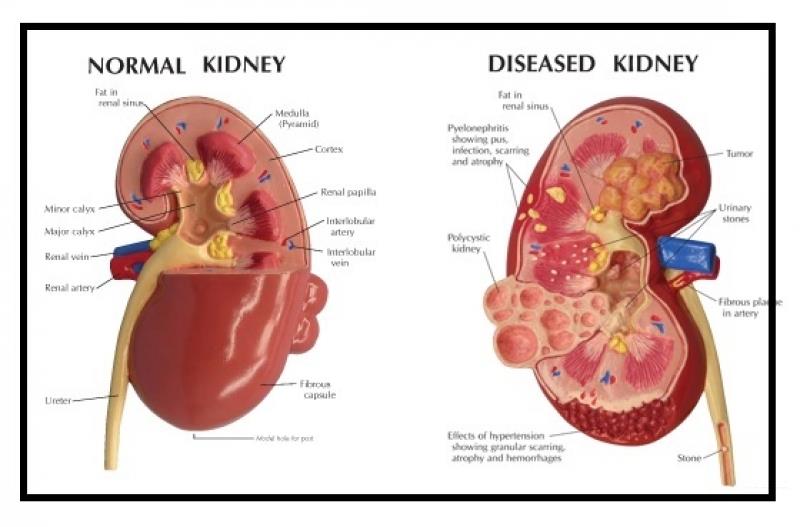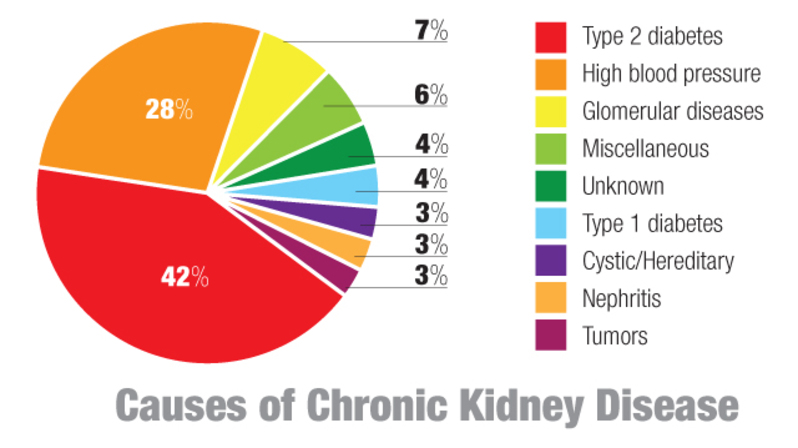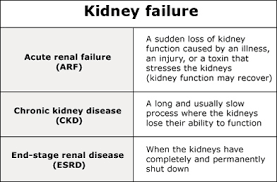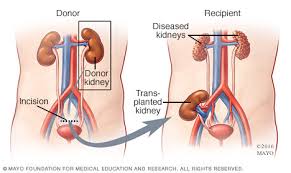What is kidney failure?
Kidney failure occurs when your kidneys lose the ability to filter waste from your blood sufficiently. Many factors can interfere with your kidney health and function, such as:
- toxic exposure to environmental pollutants or certain medications
- certain acute and chronic diseases
- severe dehydration
- kidney trauma
Your body becomes burdened with toxins if your kidneys can’t do their regular job. This can lead to kidney failure and even be life-threatening if it’s left untouched.
What are the symptoms of kidney failure?

Normal vs Diseased Kidney
Many different symptoms can occur during kidney failure. Usually someone with kidney failure will have a few symptoms of the disease, though sometimes none are present. Possible symptoms include:
- a reduced amount of urine
- swelling of your legs, ankles, and feet from retention of fluids caused by the failure of your kidneys to eliminate water waste
- unexplained shortness of breath
- excessive drowsinessor fatigue
- persistent nausea
- confusion
- pain or pressure in your chest
- seizures
- coma
What causes kidney failure?

Causes for Kidney disease
People who are most at risk for kidney failure usually have one or more of the following causes:
Loss of blood flow to the kidneys
A sudden loss of blood flow to your kidneys can prompt kidney failure. Some diseases and conditions that cause loss of blood flow to the kidneys include:
- a heart attack
- heart disease
- scarring of the liver or liver failure
- dehydration
- a severe burn
- an allergic reaction
- a severe infection, such as sepsis
High blood pressure and anti-inflammatory medications can also limit blood flow.
Urine elimination problems
When your body can’t eliminate urine, toxins build up and overload the kidneys. Some cancers can block the urine passageways.
Other conditions can interfere with urination and possibly lead to kidney failure, including:
- kidney stones
- an enlarged prostate
- blood clotswithin your urinary tract
- damage to the nerves that control your bladder
Other causes
Some diseases and conditions may lead to kidney failure, including:
- a blood clotin or around your kidneys
- infection
- an overload of toxins from heavy metals
- drugs and alcohol
- chemotherapy drugs, medications that treat cancer and some autoimmune diseases
- dyes used in some imaging tests
- certain antibiotics
- uncontrolled diabetes
How is kidney failure diagnosed?
There are several tests your doctor can use to diagnose kidney failure. These include:
Urinalysis
Your doctor may take a urine sample to test for any abnormalities, including abnormal protein or sugar that spills into the urine. Your doctor may also perform a urinary sediment examination. This measures the amount of red and white blood cells, looks for high levels of bacteria, and searches for high numbers of cellular casts.
Urine volume measurements
Measuring urine output is one of the simplest tests to help diagnose kidney failure. For example, low urinary output may suggest that kidney disease is due to a urinary blockage, which can be caused by multiple illnesses or injuries.
Blood samples
Your doctor may order blood tests to measure substances that are filtered by your kidneys, such as blood urea nitrogen (BUN) and creatinine (Cr). A rapid rise in these levels may indicate acute kidney failure.
Imaging
Tests such as ultrasounds, MRIs, and CT scans provide images of the kidneys themselves, along with the urinary tract. This allows your doctor to look for blockages or abnormalities in your kidneys.
Kidney tissue sample
Tissue samples are examined for abnormal deposits, scarring, or infectious organisms. Your doctor will use a kidney biopsy to collect the tissue sample. A biopsy is a simple procedure that’s usually performed while you’re awake. You’ll have a local anaesthetic to eliminate any discomfort. The sample is collected with a biopsy needle inserted through your skin and down into the kidney. X-ray or ultrasound equipment is used to locate the kidneys and assist the doctor in guiding the needle.
Treatment for kidney failure
Kidney Transplant
There are several treatments for kidney failure. The type of treatment you need will depend on the reason for your kidney failure. Your doctor can help you determine the best treatment option, which may include:
Dialysis
Dialysis filters and purifies the blood using a machine. The machine performs the function of the kidneys. Depending on the type of dialysis, you may be connected to a large machine or a portable catheter bag. You may need to follow a low-potassium, low-salt diet along with dialysis.
Dialysis doesn’t cure kidney failure, but it will extend your life if you go to regularly scheduled treatments.
Kidney transplant
Another treatment option is a kidney transplant. There’s usually a long wait to receive a donor kidney that’s compatible with your body, though if you have a living donor the process may go more quickly.
The advantages of a transplant are that the new kidney can work perfectly, and dialysis is no longer required. The disadvantage is that you must take immunosuppressive drugs after the surgery. These drugs have their own side effects, some of which are serious. Also, transplant surgery is not always successful.
Preventing kidney failure
There are steps you can take to reduce your risk of kidney failure.
Follow directions when taking over-the-counter medications. Taking doses that are too high (even of common drugs such as aspirin) can create high toxin levels in a short amount of time. This can overload your kidneys.
Whenever possible, you should limit your exposure to chemicals, such as household cleaners, tobacco, pesticides, and other toxic products.
Many kidney or urinary tract conditions lead to kidney failure when they’re not managed properly. Follow your doctor’s advice, always take prescribed medicine as directed, and maintain a healthy lifestyle.
Contact Expert Chikitsa consultants over Phone, Email, Facebook, Twitter and LinkedIn and resolve all your queries.
We provide detailed information regarding,
Best Hospitals in India for kidney treatment, Best Doctors for kidney transplant
Process for Kidney Transplant, Cost estimate for Kidney transplant,
Documents required for Kidney transplant
Contact Us,
Phone Numbers: +91 733 784 7661 / 62 / 63
Mail Id: Contact@Expertchikitsa.com
Website: https://www.expertchikitsa.com
Linked In: https://www.linkedin.com/in/expert-chikitsa-5a780710a
Facebook: https://www.facebook.com/ExpertChikitsa
Twitter: https://twitter.com/ExpertChikitsa





